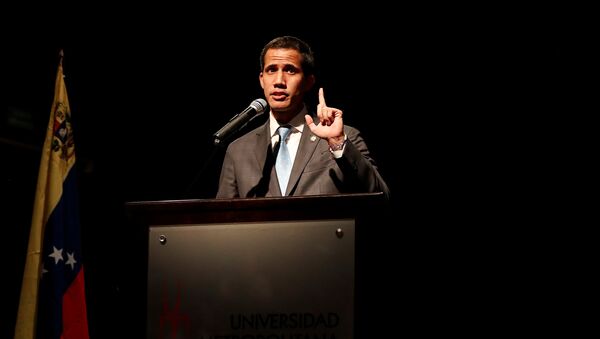Venezuela's self-proclaimed interim president Juan Guaido has denounced the expulsion of German Ambassador to Venezuela Daniel Kriener as “a threat, a verbal one”. According to him, the Venezuelan authorities had no right to announce
“In light of the situation, that is a logical move: there is political persecution, journalists are imprisoned. Cameras and equipment are confiscated… If a regime threatens, one knows what consequences that has”, he told the German public broadcaster Deutschlandfunk.
In the interview, Guaido also described his strategy as “pressure without violence”, e.g. rallies, demands for social reforms, for justice.
“Our goal is to mobilise citizens, regardless of parties, the parliament, civil society, committees, unions, students, youth, the church. A peaceful transition would help stabilise the country quickly, democratise it to hold free elections”, he insisted, also claiming that “even the military are fed up” and expressed confidence that “80, if not 85 percent want a change in contrast to the high command”.
READ MORE: Venezuelan Military Says 100 Members Left Service After Being Promised $20,000
However, earlier in March, the Colombian migration service claimed that the number of Venezuelan service members who had crossed into Colombia had surpassed 320 people. Meanwhile, the Analitica news outlet reported, citing the same agency that the number of defectors had allegedly reached 567 people. Venezuelan Ambassador to the United Nations, Samuel Moncada, said that Washington was fabricating a report about a high number of deserters in order to justify the creation of a so-called liberation army of the said military personnel to invade the South American country.
Asked about the expedience of stricter sanctions by Germany and the EU, Guaido praised Berlin’s efforts.
“You should do this [tighten sanction] with due account for the crisis in Venezuela, but they were already more active and reacted, to be fair: for example, Germany with humanitarian aid, with sanctions and with the fact that the German government respects our Constitution — and our sovereignty. Much has happened — I think all Europe could follow the German example”, he said.
Berlin joined Washington in recognising Venezuelan opposition leader Juan Guaido as the country's leader after he proclaimed himself the country's interim president on 23 January. Germany also endorsed US sanctions against Venezuela last week, with authorities promising to lobby the EU to adopt further restrictions against the country in the near future.
The tensions between Berlin and Venezuela’s legitimate government, led by embattled President Nicolas Maduro mounted after the country’s Foreign Minister Jorge Arreaza announced that Germany's ambassador to Venezuela, Daniel Kriener, had been given 48 hours to leave the country for his "interference in the country's internal affairs”. The move was prompted by Kriener’s welcoming the opposition leader at the Caracas Airport after he had returned home from a tour of allied South American nations that was organised in defiance of a government-issued travel ban in a bid to ratchet up pressure on Maduro.
On the day of the announcement, German Foreign Minister Heiko Maas said that Berlin was recalling the envoy for consultations. Maas called Venezuela's decision "inexplicable”, while the European Commission expressed hope that Venezuela might still reconsider the expulsion of the German ambassador.
READ MORE: German Minister REVEALS Why Guaido Wasn't Arrested Upon His Return to Venezuela
Reacting to the statement, Arreaza said that Caracas hoped that Brussels would return to the approach of non-interference in Venezuela's domestic affairs.
"Venezuela hopes that the European Union will regain its balance and reconsider its position on constant interference in our internal affairs, as well as its clear coordination with the strategy of Washington’s aggression and its support for the opposition’s unconstitutional actions”, Arreaza wrote on Twitter.


